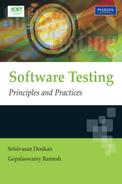Foreword
Software is becoming ubiquitous in today's world. Customers’ expectations have increased dramatically and the old fate of resignation that “it is OK for software to fail, we will have to live with it” is simply no longer applicable. Software is expected to work, meeting customers’ changing demands, first time and every time, consistently and predictably. Earlier, the software systems were used for back-office and non-critical operations of organizations. Now, more and more critical applications are implemented globally. This increased expectation for error-free functioning of software has increased the demand of quality output from software vendors. In turn, we have seen over the last decade, the focus has shifted from mere programming and development to a more holistic goal of producing software that works first time and all the time, thus increasing the focus on testing.
Testing, in particular, has attracted significant interest over the past decade. Consider the following which tell the whole story:
- the number of testing jobs has increased several-fold providing bright career opportunities;
- the compensation levels of testing functions are on the rise;
- testing has become a major opportunity for outsourcing;
- the number of conferences and similar events dedicated to testing has increased significantly over the last five years; and
- more and more professionals are considering software testing as a career.
The modus operandi of testing has also undergone a radical change, in keeping with the increased demand. Firstly, globalization is here to stay. Organizations today exploit the geographic time difference and global talent by distributing development and testing teams in different continents, working seamlessly together. In order to be successful in this new world order, an organization must master the art of working in geographically distributed teams. Secondly, testing has transformed from an ad hoc and haphazard hit-and-run attempt to a systematic, planned activity, complete with all processes and measured by scientific metrics. Thirdly, success in testing today requires careful exploitation of various technologies to meet product's time to market requirements. Test automation—automation of all parts of testing life cycle—has become a necessity and is no longer a luxury. Finally, people's aspirations in testing careers have also undergone a sea change—a successful organization should show career paths for the testing professionals and nurture their talent to ensure their longevity within the organization and within the testing profession.
This book has come in a timely fashion to address the needs of the practitioners and aspiring testing professionals and students. Both Ramesh and Srinivasan, have brought to life their forty years of combined practical experience. This book covers some of the aspects which are essential for the industry's success, but seldom touched upon by other books, such as:
- Balance between theory and practice: Most books, while trying to give theoretical rigor, try to oversimplify the real-life problems. The authors have consistently started from what exists in the real world and have provided the theoretical foundation to address the real life situations.
- Balance between people, process, and technology issues: Successful organizations work systematically, exploit technologies and leverage people. The authors have successfully resisted the temptation of only discussing “cool technology issues” at the expense of practicalities. As an example, you will find coverage of topics like automation (which is technology-intensive), people and organizational structures (which is people-centric) and test organization and reporting (which is process-focused).
- A solid exposure to foundations, from a practical viewpoint of the practitioners: The authors have covered all the different types of testing extensively. As an example, topics like Internationalization—which are considered esoteric—are discussed at length.
- This book is the first that I know which has recognized and articulated the importance of globalization and explicitly discussed the various global team structures possible and the issues thereof. This clearly demonstrates the authors experience of leading global software testing teams.
- This book covers some of the recognized methodologies for testing which have been accepted and presented in several international testing conferences throughout the world.
In addition to all of the above, the practical exercises given at the end of the chapters will expose the reader to the realities of testing. The authors’ experience of teaching full semester courses on software testing is evident in various exercises. I am confident that with the advent of this book, such courses will spread to various colleges and universities, thereby formalizing software testing as a discipline and widening the net for developing more competent testing professionals.
I wish the book and the authors all success in their continuing endeavor to create an environment where software testing is considered a critical phase of any software development life cycle, careers in testing are valued significantly, and testing develops as an engineering discipline.
Vikram Shah
Vikram Shah is the president of the Indian operations of Network Appliance (NetApp), a leading; provider of innovative solutions that simplify the complexities of data management. He graduated from BITS, Pilani, in Electrical and Electronics Engineering and did his M.S. in Computer Science from the University of California, Berkeley, USA. In an illustrious career spanning in excess of three decades, Shah has held senior management positions in India and abroad with Novell, Tata Consultancy Services, Tata InfoTech Ltd, Tech Mahindra and Tata-IBM. A past cheirman of the mdo-American Chamber of Commerce and arc active member of the American Chamber of Commerce, Shah is widely acclaimed in the Indian IT world. He was a member of the Karnataka Chief Minister's Task Force of Information Technology as well as a member of the Board for IT Education Standards (BITES). Shah is also an honorary board member of start-up companies mentoring entrepreneurs.
